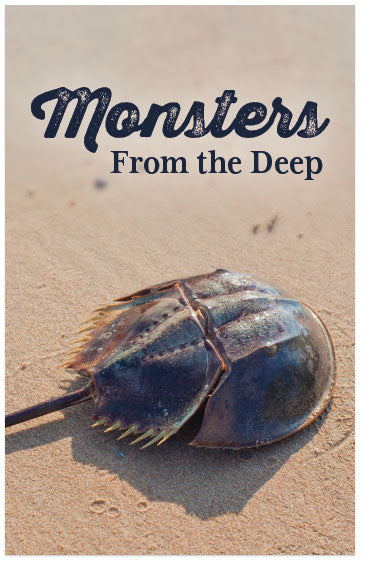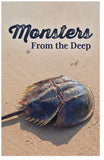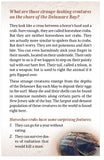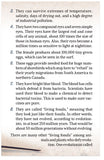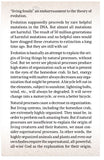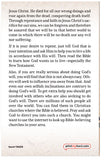Monsters From The Deep
Special-Order Folded Tract
 NOTE: This item is custom-printed to order (click for more details).
NOTE: This item is custom-printed to order (click for more details).
This tract is from our print-on-demand library, and is not kept in stock. Select the options below, and we will custom-print a batch just for you. Because this item is custom-printed, you can add your custom imprint to the back page at no extra cost.
- Estimated shipping date: Monday, January 12 (Click for more details)
- SKU:
- Discounts: Discount coupons do not apply to this item
- Format: Folded Tract
- Size: 3.5 inches x 5.5 inches
- Pages: 6
- Imprinting: Available with 2 lines of custom text
- Returns: Because this item is custom-printed to order, it cannot be returned.
Show all item details
The full text of this tract is shown below. (Do you want to print this tract in a different version than the one listed? Contact us and let us know what you're looking for—we may be able to create the alternate version for you at no charge.)
What are those strange-looking creatures on the shore of the Delaware Bay?
They look like a cross between a horse’s hoof and a crab. Sure enough, they are called horseshoe crabs. But they are neither horseshoes nor crabs. They are actually more similar to spiders than to crabs. But don’t worry. They are not poisonous and don’t bite. You can even harmlessly stick your finger in their mouth, located on their underside. Their only danger to us is if we happen to step on their pointy tail with our bare feet. Their tail, called a telson, is not a weapon; but is used to right the animal if it gets flipped over.
These strange creatures emerge from the depths of the Delaware Bay each May to deposit their eggs in the surf. Many die and their shells can be found in immense numbers along certain parts of the New Jersey side of the bay. The largest and densest population of these creatures in the world is found right here.
Horseshoe crabs have some surprising features:
1. They can go for a year without eating.
2. They can survive doses of radiation that would kill a man.
3. They can survive extremes of temperature, salinity, days of drying out, and a high degree of industrial pollution.
4. They have two compound eyes and seven simple eyes. Their eyes have the largest rod and cone cells of any animal, about 100 times the size of those in human eyes. Also, their eyes become a million times as sensitive to light at nighttime.
5. The female produces about 100,000 tiny green eggs, which can be seen in the surf.
6. These eggs provide needed food for huge numbers of shorebirds which stop here to “refuel” in their yearly migrations from South America to northern Canada.
7. They have bright blue blood. The blood has cells which defend it from bacteria. Scientists have used their blood to make a chemical to detect bacterial toxins. This is used to make sure vaccines are pure.
8. They are called “living fossils,” meaning that they look just like their fossils. In other words, they have not evolved, according to evolutionists, in at least 250 million years. That would be about 50 million generations without evolving.
There are many other “living fossils” among animals and plants who defy evolution. One evolutionist called “living fossils” an embarrassment to the theory of evolution.
Evolution supposedly proceeds by rare helpful mutations in the DNA. But almost all mutations are harmful. The result of 50 million generations of harmful mutations and no helpful ones would have dragged these creatures to extinction a long time ago. But they are still with us!
Evolution is basically an attempt to explain the origin of living things by natural processes, without God. But we never see physical processes produce high states of organization such as what is present in the eyes of the horseshoe crab. In fact, energy interacting with matter always decreases any organization that might be present. A bicycle left out in the elements, subject to sunshine, lightning bolts, wind, etc., will always be degraded. It will never change into a motorcycle, or even a better bicycle.
Natural processes cause a decrease in organization. But living systems, including the horseshoe crab, are extremely highly organized. They must be, in order to perform such amazing feats. But if natural processes are insufficient to explain the origin of living creatures and their features, we must consider supernatural processes. In other words, the highly organized animals and plants and even our own bodies require the supernatural, all-powerful, all-wise God as the explanation for their origin. Therefore, we conclude that this physical universe is not all there is. There must be a God!
But some object to the existence of God because of the evil and suffering we see in this world. However, these terrible realities in no way negate the above conclusion. So, what is the explanation for these negative aspects of creation? Why does God allow evil to exist? Since God is so great, as we realize from the things we see, it is reasonable to believe that He is superior to us in all ways. So, there must be an explanation for the existence of evil and suffering.
If we have a sense of justice, then God is even more just. And, if we can love our children, then God must love us even more. So, since we do not always see justice and love prevail in this world, we conclude that this life is not all there is. There will come a day when God will judge us to see who is fit to inhabit a new and better world, where justice and love will prevail.
The question now arises—what must we do in order to enter that better world? In the Bible, God tells us that we must repent because He will judge the world in righteousness (Acts 17:30,31). To repent means to turn to God and to seek to do His will in all things. For those who repent, God has graciously provided a way that we may receive forgiveness for all of our wrong doings. This way is Jesus Christ. He died for all our wrong doings and rose again from the dead, conquering death itself. Through repentance and faith in Jesus Christ’s sacrifice for our sins, we can be forgiven and therefore be assured that we will be in that better world to come in which there will be no death nor any evil nor suffering.
If it is your desire to repent, just tell God that is your intention and ask Him to help you to live a life in accordance with His will. Then read the Bible to learn how God wants us to live—especially the New Testament.
Also, if you are really serious about doing God’s will, you will find that this is not always easy. Others will seek to influence you away from that. And even our own selfish inclinations are contrary to doing God’s will. To get extra help you should get involved with others who are also seeking to do God’s will. There are millions of such people all over the world. You can find them in Christian churches where the Bible is believed. Pray and ask God to direct you into such a church. You might want to use the internet to look up Bible-believing churches in your area.

